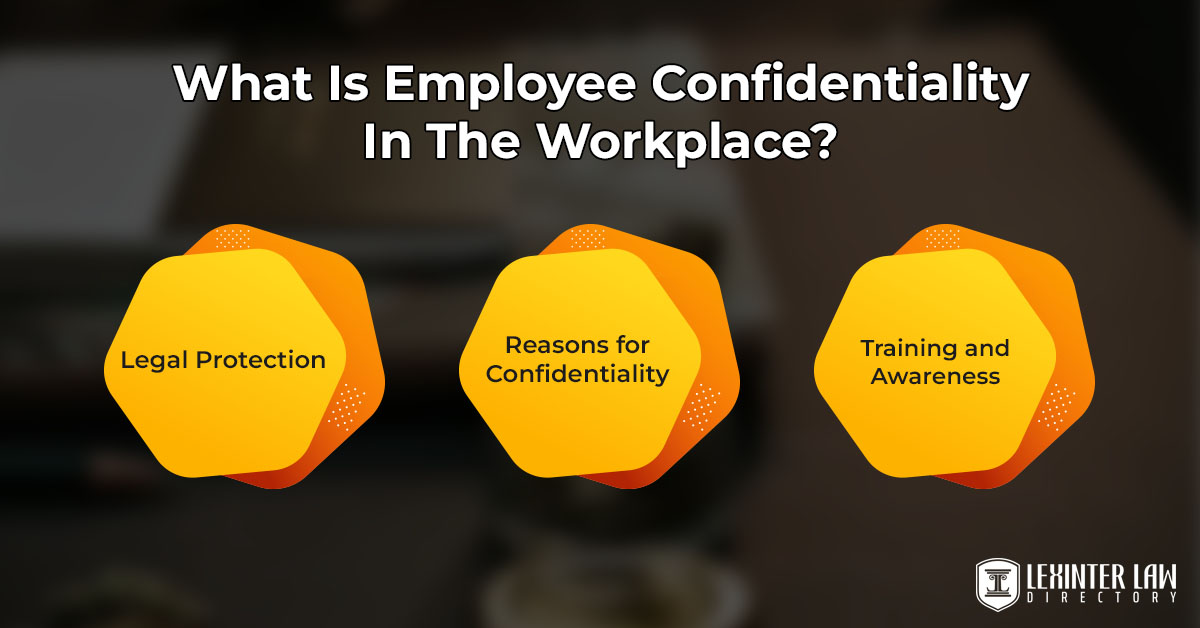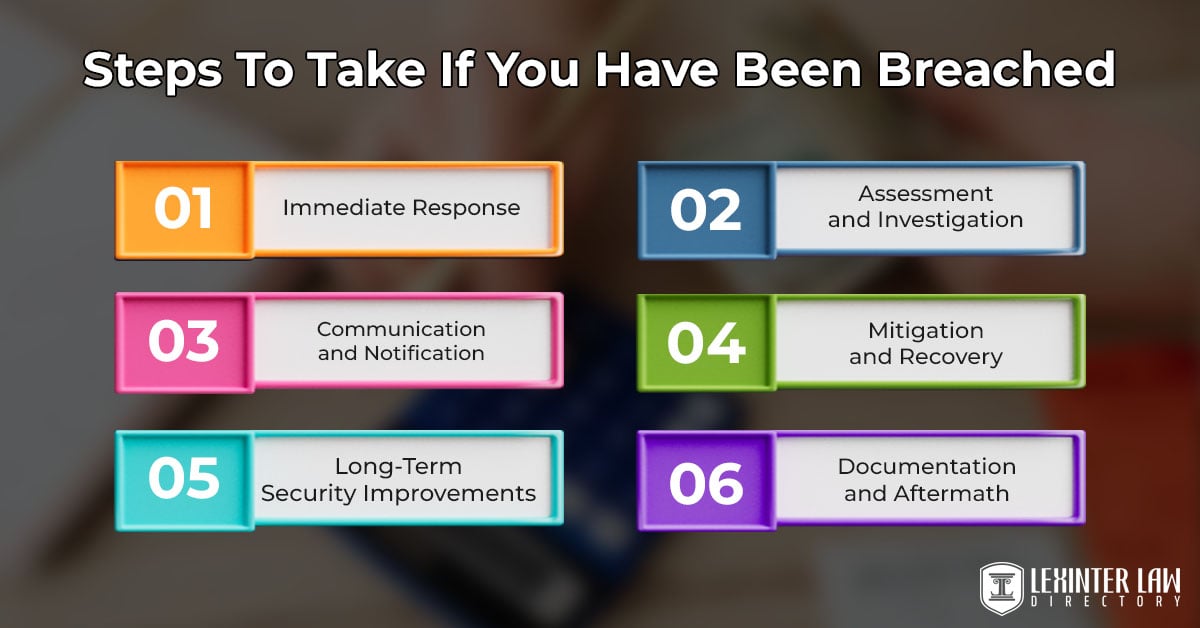The Importance Of Employee Confidentiality In The Workplace, And What To Do If You Have Been Breached
In the world of business and technology, information is power. Most companies keep sensitive information about their clients, employees, products, services, vendors, and more confidential. However, some employees may feel that they cannot trust others with this information or may feel pressure to share it. When an employee breaches confidentiality in the workplace, it can be a major problem for the company and its ability to function effectively moving forward.
Every company needs to have clear policies in place regarding employee confidentiality as well as consequences for breaching that confidentiality if there is a breach. Here are some important facts about employee confidentiality in the workplace and what you should do if you have been breached.
You can read more about breaches of confidentiality at work here.
Table of Contents
- What Is Employee Confidentiality In The Workplace?
- Key Reasons For Confidentiality In The Workplace
- Key Aspects Of Employee Confidentiality In The Workplace
- Benefits Of Maintaining Confidentiality In The Workplace
- Consequences Of Breaching Confidentiality In Workplace
- Steps To Take If You Have Been Breached
- FAQs
- Conclusion
What Is Employee Confidentiality In The Workplace?

Employee confidentiality is the act of keeping business and employee information private. This can include things like trade secrets, client information, financials, or anything that could give an advantage to a competitor if they were to find out. It is important to note that employee confidentiality is not the same thing as privacy.
Privacy is something that every employee has an expectation of within the workplace, while confidentiality is something that an employee agrees to uphold by signing a contract or nondisclosure agreement. If you are an employer, it is your responsibility to make sure your employees understand what is confidential and what is not. Employees should also understand the consequences of breaching confidentiality. When it comes to new employees, it’s important to get a grasp on this as early as onboarding. For example, once you find a good partner for logistics recruitment and the process is done, and you have found the most suitable candidate for the job, it is important to make sure they understand the importance of confidentiality in your company. Proper training and education about employee confidentiality is crucial for creating a culture of trust and respect within the workplace.
Key Reasons For Confidentiality In The Workplace
Confidentiality in the workplace ensures the protection of sensitive information, fosters trust, and prevents unauthorized access to critical data. Maintaining confidentiality helps organizations comply with legal obligations and enhances their reputation among employees, clients, and stakeholders.
Protecting Sensitive Information
Protecting sensitive information in the workplace is crucial to prevent unauthorized access and potential misuse. Confidential data such as financial records, employee information, and trade secrets require secure storage and restricted access. Implementing advanced cybersecurity measures and regular audits helps organizations mitigate risks.
Training employees about confidentiality policies ensures adherence and fosters a culture of responsibility. Maintaining robust protections for sensitive information safeguards an organization’s integrity and competitive edge.
Maintaining Trust Among Employees
Maintaining trust among employees is essential for fostering a supportive and collaborative work environment. Employees feel valued and secure when their personal and professional information is kept confidential. Trust built on confidentiality promotes open communication, teamwork, and higher morale, improving overall productivity.
Breaches of confidentiality can erode trust, leading to dissatisfaction and turnover. Organizations should implement clear policies and transparent practices to reinforce trust and ensure a positive workplace culture.
Preventing Misuse Of Company Data
Preventing misuse of company data is vital for protecting an organization’s competitive position and intellectual property. Sensitive information, such as client details and proprietary processes, must be shielded from unauthorized use. Non-disclosure agreements (NDAs) and robust access controls are critical safeguards.
Regular monitoring and employee training help identify and mitigate risks. A proactive approach to data security ensures that employees and partners respect confidentiality protocols.
Ensuring Compliance With Laws
Ensuring compliance with laws related to data protection is a legal responsibility of every organization. Regulations such as the General Data Protection Regulation (GDPR) and other local laws mandate strict handling of sensitive information. Failure to comply can lead to severe fines, legal actions, and reputational damage.
Organizations must establish detailed data protection policies and provide regular training to employees. Maintaining compliance reflects an organization’s commitment to ethical practices and legal standards.
Enhancing Organizational Reputation
Enhancing organizational reputation through confidentiality practices strengthens trust among clients, employees, and stakeholders. A reputation for safeguarding sensitive information attracts business opportunities and boosts client retention. Confidentiality breaches, however, can damage an organization’s credibility and lead to financial losses.
Transparent communication about confidentiality measures reassures stakeholders of the organization’s commitment to ethical practices. Investing in advanced security protocols reflects the organization’s dedication to maintaining high professional standards.
Key Aspects Of Employee Confidentiality In The Workplace
Key aspects of employee confidentiality in the workplace encompass safeguarding personal information, financial data, health records, performance reviews, and sensitive company communications. Protecting these elements ensures privacy, fosters trust and maintains compliance with legal standards.
Personal Employee Information
Personal employee information includes data such as birth dates, home addresses, and Social Security numbers. Unauthorized access to this information can lead to identity theft or privacy violations. Employers must implement strict access controls to protect personal data. Regular audits and employee training reinforce the importance of confidentiality. Maintaining the privacy of personal information fosters trust within the organization.
Financial And Payroll Data
Financial and payroll data encompass employees’ bank account details, salary information, and tax records. Exposure to this data can result in financial fraud or identity theft. Employers should use secure payroll systems to manage financial information. Limiting access to authorized personnel reduces the risk of data breaches. Regularly updating security protocols ensures ongoing protection of financial data.
Health Records And Medical History
Health records and medical history include information about an employee’s medical conditions and treatments. Unauthorized disclosure can lead to discrimination or stigmatization in the workplace. Employers are legally obligated to keep medical information confidential. Storing health records separately from other employee files enhances security. Access should be restricted to personnel with a legitimate need to know.
Performance Reviews And Feedback
Performance reviews and feedback provide insights into an employee’s job performance and areas for improvement. Confidentiality ensures honest communication between employees and supervisors. Unauthorized sharing can damage professional relationships and morale. Employers should store performance evaluations securely and limit access. Clear policies regarding the confidentiality of performance data are essential.
Sensitive Company Communications
Sensitive company communications include internal memos, strategic plans, and proprietary information. Unauthorized disclosure can harm the company’s competitive position. Employers should classify sensitive communications and implement access controls. Using encrypted communication channels enhances security. Regular training on handling confidential information helps prevent accidental leaks.
Benefits Of Maintaining Confidentiality In The Workplace
Maintaining confidentiality in the workplace offers numerous benefits, including building employee trust, protecting the company’s reputation, preventing legal consequences, encouraging open communication, and safeguarding sensitive data.
Builds Employee Trust
Maintaining confidentiality builds employee trust by ensuring personal information remains protected within the organization. Employees who feel their private data is secure are more likely to engage fully and contribute positively.
Trust fosters a collaborative environment, enhancing overall productivity and job satisfaction. Employers should implement clear confidentiality policies to reinforce this trust. Regular training on data protection emphasizes the organization’s commitment to employee privacy.
Protects Company Reputation
Protecting a company’s reputation involves safeguarding sensitive information from unauthorized access or disclosure. Confidentiality breaches can lead to public distrust and damage the organization’s image. Implementing robust security measures helps prevent data leaks that could harm the company’s standing.
A strong reputation attracts clients and retains top talent, contributing to business success. Regular audits ensure compliance with confidentiality protocols, maintaining public confidence.
Prevents Legal Consequences
Preventing legal consequences requires adherence to confidentiality laws and regulations governing data protection. Unauthorized disclosure of sensitive information can result in lawsuits and financial penalties. Employers must establish comprehensive policies to ensure compliance with legal standards.
Regular employee training on confidentiality reduces the risk of accidental breaches. Proactive measures in data protection safeguard the organization from potential legal issues.
Encourages Open Communication
Encouraging open communication is achieved by assuring employees that their discussions remain confidential. A secure environment enables staff to voice concerns and share ideas without fear of repercussions.
Confidentiality fosters transparency, leading to improved problem-solving and innovation. Employers should promote policies that protect the privacy of internal communications. Trust in confidentiality encourages a culture of openness and mutual respect.
Safeguards Sensitive Data
Safeguarding sensitive data involves implementing measures to protect proprietary information from unauthorized access. Data breaches can lead to financial loss and competitive disadvantages.
Employers should utilize advanced security technologies to secure confidential information. Regularly updating security protocols ensures ongoing protection against emerging threats. A proactive approach to data security maintains the integrity of organizational assets.
Consequences Of Breaching Confidentiality In Workplace
Breaching confidentiality in the workplace can lead to significant consequences, including loss of employee trust, potential legal penalties, damage to company image, increased risk of data theft, and negative impacts on workplace morale.
Loss Of Employee Trust
Breaching confidentiality erodes employee trust, leading to decreased morale and productivity. Employees expect their personal information to remain protected within the organization. When confidentiality is compromised, it creates an environment of fear and insecurity. This loss of trust can result in higher turnover rates and difficulty in retaining talent. Maintaining confidentiality is essential for fostering a trustworthy workplace culture.
Potential Legal Penalties
Violating confidentiality agreements can result in severe legal consequences, including lawsuits and financial damages. Organizations face legal action from affected parties whose confidential information was disclosed without authorization. Courts can impose monetary penalties to compensate for losses incurred due to the breach. Criminal charges are sometimes filed, leading to further legal complications. Adhering to confidentiality agreements is crucial to avoid such legal repercussions.
Damage To Company Image
Confidentiality breaches can tarnish a company’s reputation, leading to loss of clients and business opportunities. Public disclosure of sensitive information undermines trust in the organization’s ability to protect data. This damage can have long-term effects, making it challenging to attract new clients or partners. Maintaining a strong reputation requires stringent confidentiality practices to prevent unauthorized disclosures.
Increased Risk Of Data Theft
Breaching confidentiality increases the risk of data theft, exposing the organization to cyberattacks and fraud. Unauthorized disclosure of sensitive information can make the company a target for malicious actors. Implementing robust security measures and employee training can help mitigate these risks. Protecting confidential information is essential to safeguard the organization from potential threats.
Impact On Workplace Morale
Confidentiality breaches negatively impact workplace morale, leading to decreased employee engagement and satisfaction. When employees feel their private information is not secure, it creates an atmosphere of distrust. This can result in reduced collaboration and increased conflicts among staff. Maintaining confidentiality is vital to promote a positive and productive work environment.
Why Is Employee Confidentiality Important In The Workplace?
If you have ever worked in a common area, like a cubicle farm, you know that it can be difficult to keep your work completely private. Your co-workers are on either side of you and could easily see what you are doing. When you are on the phone with a client, there is no way to keep the conversation private. The best way to protect sensitive information and keep it between you and the person you are talking with is to keep it confidential.
In the workplace, confidentiality makes sure that all of your employees know that they should be keeping everything they hear or see confidential. If they know that there are real consequences for breaching confidentiality, they will be less likely to breach it themselves.
Breaching Confidentiality In The Workplace: Harmful Effects
Breaching confidentiality can cause a lot of damage. For one thing, your company could lose clients and revenue because of information getting out. If a client’s competitors learn how much your client has spent or what they are using, they may decide to undercut them or offer a better deal. If a client’s competitors find out about their services, products, or plans, it could seriously hinder their ability to accomplish their goals.
There are other potential harms to breaching confidentiality as well. If an employee who breached confidentiality is in an HR meeting or conference call, the person on the other end of the line could call the company and report the employee for being unprofessional. If a client overhears an employee talking about confidential information, the client could decide to stop doing business with the company. The information may also be damaging to your employees’ reputation, making it harder for them to do their jobs effectively if clients are against them.
Steps To Take If You Have Been Breached

If you have been breached, the first step is to try to figure out how the breach happened. This will help you to know what to do next. Ask yourself questions like, “Who has access to this information?” and “Are there any times when a person may have inadvertently breached confidentiality?” Next, you will want to decide what you want to do about the breach. There are a few options: You can seek to repair the damage, you can fire or otherwise discipline the employee, or you can try to prevent the breach from happening again.
The best choice for you will depend on your situation. If you decide to fire the employee, make sure you follow the correct protocol, so you don’t end up losing a wrongful termination lawsuit. If you decide to discipline an employee, make sure that you follow your company’s procedures for doing so.
Immediate Response
Immediate response to a data breach involves swiftly identifying and containing the incident to minimize damage. Activating the incident response team ensures a coordinated approach to address the breach effectively. Isolating affected systems prevents further unauthorized access and data exfiltration.
Preserving evidence is crucial for subsequent investigation and legal proceedings. Prompt action can significantly reduce the impact of the breach on the organization.
Assessment And Investigation
Assessment and investigation require a thorough analysis to determine the breach’s scope and origin. Identifying compromised data types helps in understanding potential risks to affected parties. Analyzing attack vectors provides insights into vulnerabilities exploited during the breach. Collaborating with cybersecurity experts enhances the investigation’s effectiveness. Comprehensive assessment informs subsequent remediation efforts and future prevention strategies.
Communication And Notification
Communication and notification involve promptly and transparently informing stakeholders about the breach. Notifying affected individuals allows them to take protective measures against potential data misuse. Regulatory bodies require notification to ensure compliance with legal obligations. Clear communication helps maintain trust and mitigates reputational damage. Guiding steps to safeguard personal information is essential.
Mitigation And Recovery
Mitigation and recovery focus on addressing vulnerabilities and restoring normal operations securely. Implementing patches and updates prevents the recurrence of similar breaches. Enhancing security measures strengthens the organization’s defense against future attacks. Monitoring systems for unusual activity ensures early detection of potential threats. Conducting a post-recovery review identifies lessons learned to improve response strategies.
Long-Term Security Improvements
Long-term security improvements involve developing strategies to enhance the organization’s cybersecurity posture. Regular security audits identify and address emerging vulnerabilities. Employee training programs raise awareness about data protection best practices. Implementing advanced security technologies provides robust defense mechanisms. Establishing an incident response plan ensures preparedness for future incidents.
Documentation And Aftermath
Documentation and aftermath processes involve recording all actions taken during the incident response. Detailed documentation provides a basis for analyzing the effectiveness of the response. Reviewing the incident helps identify areas for improvement in security policies. Sharing insights gained can benefit the broader cybersecurity community. Continuous improvement efforts enhance resilience against future breaches.
FAQs
1. What Are The Legal Obligations Regarding Employee Confidentiality?
Organizations must comply with laws like the GDPR, HIPAA, or local labor laws to safeguard employee information. These regulations require secure storage, limited access, and proper handling of sensitive data. Violations result in fines, lawsuits, or reputational damage, emphasizing the need for robust confidentiality policies.
2. What Role Does HR Play In Ensuring Confidentiality?
HR manages sensitive employee data, enforces confidentiality policies, and trains staff on data protection best practices. By implementing secure systems and addressing breaches promptly, HR upholds trust and compliance with legal requirements, ensuring a secure workplace environment that protects employee and organizational interests.
3. What Industries Have Stricter Employee Confidentiality Requirements?
Healthcare, finance, and legal industries have stricter confidentiality requirements due to sensitive data like medical records, financial transactions, or legal documents. Regulatory frameworks like HIPAA, GDPR, and the Sarbanes-Oxley Act mandate stringent data protection measures, emphasizing confidentiality to prevent breaches and ensure compliance.
Conclusion
Breaching confidentiality can have serious consequences for your company, your employees, and your clients. Make sure that you clearly communicate what information is confidential and what the consequences for breaching confidentiality are so that no one makes an accidental mistake. If your company has been breached, it is important to take the necessary actions to deal with the situation as soon as possible so that the damage can be contained.

